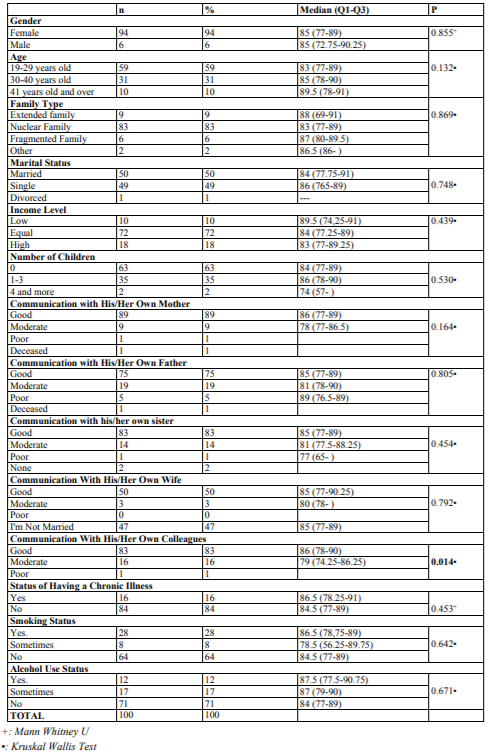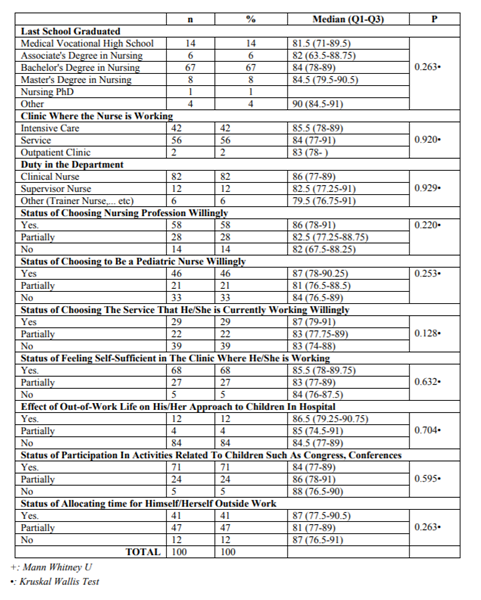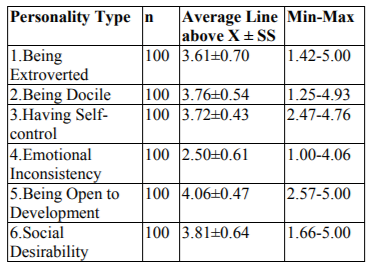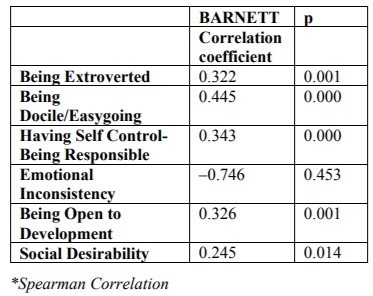Information
Journal Policies
The Impact of the Personalities of Pediatric Nurses on their Degree of Love for Children
Aysegul karaca1, Ayfer acikgoz2*
2.Eskisehir Osmangazi University Faculty of Health Sciences, Department of Child Health and Pediatric Nursing AD., Eskişehir/Turkey
Copyright : © 2018 Authors. This is an open-access article distributed under the terms of the Creative Commons Attribution License, which permits unrestricted use, distribution, and reproduction in any medium, provided the original author and source are credited.
Introduction: It is important that the health team working with children loves them. Healthcare professionals who spend the longest time with children are pediatric nurses. When choosing pediatric nurses, the child-loving behaviors and other factors affecting this should be known. There are many factors that can affect the degree of love that nurses have for children. One of these factors is personality types.
Purpose: This study was made with the purpose of analyzing the effect of personality types of the nurses on the degree of child-love.
Method: This study is a descriptive study. The sample of the research is composed of 102 nurses who accept to join the study. The study was completed with 100 nurses because of the missing information in 2 of the filled surveys. In the study, Descriptive Information Form, Five Factor Personality Type Scale and Barnet Children's Love Scale that are developed by the researchers were used.
Results: In our study, there was positive statistical significance between extrovert, tender-minded, self-control and responsible, openness for improvement, high social desirability personality traits and the degree of child-love, and a negative statistical significance between emotional inconsistency personality trait and degree of child-love.
Conclusion and Recommendations: There was a significant relationship between nurses' personality types and the degree of child-love. We advise considering personality types in the determination of nurses who will work in pediatric clinics.
Nurse, Degree of Child-Love, Personality Types,Nursing and Healthcare
1. Introduction
One of the most basic needs of children is love. Love can be described as "all positive and good feelings that bring people closer together". Love, like hunger and thirst, is a necessity that must be constantly satisfied (Yörükoğlu 1983). Especially the love that is expected in the infancy and early childhood is the most important factor for the survival of the human cubs. Because, unlike other living creatures, people need much more attention, dislike and love. The love and compassion that the child has seen since coming to the world has also improved his ability to love others in the following years. Parents do not only care for the child, but also meet their need for love and attention. Behavior, social relations and adjustment to society of a child growing up in a loving and peaceful family environment is shaped positively (Altıparmak 2008). The most important sources of love for children after their parents are their siblings, relatives, teachers and friends.
Children hospitalized may stay away from some or all of these sources, but their need for love continues. At this point, health workers come into play. The loving approach of health professionals ensures that the child feels safe in the hospital environment, it accelerates the healing process and meets one of the most basic needs. Therefore, it is very important for the health-care team working with children to love children. Health workers who spend the longest time with children are pediatric nurses. When selecting pediatric nurses, their liking of children behavior and other factors affecting it should be known. It is stated in the literature that the characteristics of the family (number of siblings, income level, parental age and etc.), the factors related to the school, the environment and society (religious values, sexual roles and etc.) (Bayhan and Artan 2009), the situations such as playing games with children and willingness to work in pediatric service (Bektaş et al., 1985) are among these factors. Another factor may be the personality type of the individual.
Personality refers to the general and specific traits of the individual and how these traits direct the individual's social life (Bayhan and Artan 2009). In the literature, there was no study investigating the effect of personality types of nurses on their level of liking of children. However, personality traits of an individual may indicate whether or not he/she is suitable for working in pediatric services. According to this study, nurses’ personality types are important for showing their level of child love. Our study was conducted to determine the personality types of pediatric nurses and to investigate the effect of their personality types on their level of liking of children.
2. Materials And Method
Our study was carried out with pediatric nurses working in 3 hospitals, one in Eskişehir and two in Konya Provinces of Turkey. Before the study, ethics committee approval and institutional permissions were obtained. The sample of the study consisted of 102 nurses who agreed to participate in the study. The study was completed with 100 nurses because 2 of the questionnaires were missing information.
In the study, descriptive questionnaire developed by researchers, Barnett Liking of Children Scale and Five-Factor Personality Traits Scale were used. Barnett Liking of Children Scale was developed by Barnett and Sinisi (1990) to measure people's attitudes towards children was adapted to Turkish by Duyan and Gelball (2010) and its Cronbach Alpha value was found as 0.92. There are 14 items on the scale that determine the individuals' liking of children. Scores that can be taken from the scale range from 14 to 98. High scores taken in the scale means that these people love children more.
Five-Factor Personality Traits Scale was developed by Tatar et al. (2002) and consists of 85 items. Each personality type is assessed separately on the scale. Scale has factors such as being extroverted, docile/easygoing, emotionally inconsistent, open to development and having self-control/being responsible. The Cronbach Alpha value of these factors ranged from 0.80 to 0.87. Traits of the being extroverted factor are to be lively, outgoing, social, active, enthusiastic, relaxed, natural and optimistic. Traits of being docile/easy going factor are avoiding conflict, being sensitive, compassionate, easygoing, calm, cooperative and trusting people. Traits of the self-control/being responsible factor are being organized, planned, purposeful, determined, cautious, vigilant and responsible. Emotional inconsistency factor, on the other hand, defines sensitive, emotional, anxious, nervous, unresistant and impulsive personalities. Being Open to Development Factor covers analytical thinking, being sensitive, having a wide range of interests, being innovative and creative personalities.
In our study, questionnaires were filled out by individuals themselves. In the power analysis performed at the end of the study, power of the study was found as 99% for α= 0.05, β= 0.80. Analysis of the data was performed with the IBM SPSS 21 (IBM Corp. Released 2012. IBM SPSS Statistics for Windows, version 21.0, Armonk, NY: IBM Corp.) package software. Normal distribution of quantitative variables was performed by Shapiro-Wilk test. Summary representation of the quantitative variables that follow normal distribution is expressed as mean ± standard deviation and those who do not follow this are stated as median (Q1-Q3). During the comparison of the two independent groups, if data shows normal distribution, Independent sample t test, if not, Mann Whitney U test was used. During the comparison of the three independent groups, if data shows normal distribution, One-Way Variance Analysis, if not, Kruskal Wallis Test was used. In one-way analysis of variance, two-way comparisons of the groups were performed using the Tamhane test because the variance was not homogeneous. In Kruskal Wallis Test, two-way comparisons were performed using Dunn's Test. Qualitative variables in this study are shown as frequency and percentage. In the study, p< 0.05 was considered significant.
3. Findings
Our study was completed with a total of 100 pediatric nurses. In our study, the average level of nurses' liking of children is 87.6 for female nurses and 86.1 for male nurses (min. = 37, max = 98).
In Table 1, the descriptive characteristics of the nurses who participated in the study and the relationship of these characteristics with nurses' levels of Barnett Liking of Children Scale were given. A significant correlation was found only between the relationship of the nurses with their colleagues and their level of liking of children (p = 0.014). Only 1 person had a psychological disease (panic attack) among the nurses participated in our study.
In Table 2, the relationship between descriptive characteristics of the nurses participating in the study related to their education and work life and their levels of Barnett Liking of Children Scale are shown. There is no significant correlation between nurses' working years and the working years in their current clinics and their levels of Barnett Liking of Children Scale (p> 0.05).
Table 3 shows the mean and standard deviations of nurses' personality traits' sub dimensions. It was found that the emotional inconsistency levels of nurses were the lowest in comparison to the other sub-dimensions, and their being open to development was the highest in comparison to the other sub-dimensions.
Table 4 shows the relationship between nurses' personality types and their level of liking of children. A positive statistical significance was determined between individuals with high social desirability level and personality traits such as being extroverted, docile/easy going, having self-control/ responsible, open to development and their level of liking of children. On the other hand a negative statistical significance was determined between individuals with emotional inconsistency and their level of liking of children.
4. Discussion
In our study, the average level of nurses' liking of children is 87.6 for female nurses and 86.1 for male nurses (min. = 37, max = 98). In the studies conducted, nurses' liking of children level varies between 82.07 and 87.58 (Tural Büyük et al., 2014, Erdem and Duyan 2011, Akgün Kostak et al., 2017). Scores that can be taken from Barnett Liking of Children Scale range from 14 to 98, and high scores mean that people love children more (Barnett and Sinisi 1990, Duyan and Gelball 2010). According to this, the average score of nurses participating in our study can be said to be high.
In our study, no significant relationship was found between the descriptive characteristics of nurses and their level of liking of children (p>0.05) (Table 1). Similar to our study, Tural Büyük et al. (2014) found that nurses' level of liking of children were not influenced by their socio-demographic characteristics. Bektaş et al. (2015) in their study on nursing students, found no significant relationship between gender and liking of children, whereas there was a significant relationship between the number of siblings and liking of children. There is also an important relationship between the nurses' desire to work in pediatric clinics and their average scores of liking of children. In a study conducted on male nursing students in Jordan by Al-Ma'aitah and Gharaibeh (2000), the students’ views on working with children after graduation were examined. In this study, it was stated that the students think that it was more appropriate for women to work in pediatric services rather than men, and that the most important reason underlying this misconception was the socio-cultural perspectives of the students. In Erdem and Duyan (2011) 's study, it was found that age, having children and educational status did not affect the level of liking of children, whereas there was a significant relationship between marital status and liking of children. In Akgün Kostak's study (2013), an important relationship was determined between gender of the students, their having a sibling and their liking of children. In a study by Akgün Kostak et al. (2017), nurses with higher education and income levels were found to have a higher level of liking of children. These differences between studies may be due to the fact that studies were conducted on different populations and that individuals' level of liking of children are also affected by characteristics such as socio-cultural factors and religious beliefs.
In our study, occupational characteristics of nurses and their levels of liking of children were compared (Table 2). It was determined that as the positive communication of the nurses with their friends increased, their level of liking of children also increased (p = 0.014). In a study (Bratt et al., 2000), it was found that there was a relationship between occupational satisfaction and group harmony. In the literature (Blegen 1993, Irvine and Evans 1995), it is stated that there is a relationship between occupational satisfaction and a positive working environment perception, and also between harmonious and cooperative employee relations and supportive management. At the same time, stress has a negative effect on the occupational satisfaction of nurses and the quality of patient care (Blegen 1993, Irvine, Evans 1995). Negative relations with colleagues can also be a source of stress. In our study, the reflection of the nurses' communication with their friends on their levels of liking of children may be related to this.
No significant relationship was found between the other occupational characteristics of the nurses and their level of liking of children in our study (Table 2) (p> 0.05). In the study conducted by Erdem and Seyran (2011), it was found that the statistical difference between the place, duty, working hours and liking of children was not significant, on the other hand, the difference between liking of children and the number of children cared per day was significant. In studies conducted on nursing students (Bektaş et al., 2015, Akgün Kostak, 2013), a significant relationship was found between willingness to work in pediatric service and liking of children. In a study conducted on 793 nursing students by Happell (2000), working with children was found to be the most popular option among nursing students in nine possible career options (public health, psychiatry, elderly, and etc). In the same study, 85% of the students stated that they wanted to work with children, because they liked children, believed that the idea of working with children would be nice and that it would be a positive working environment. Our study results are similar to those in which there are no differences.
In our study, we found a relationship between nurses' personality types and their level of liking of children (Table 4). A positive statistical significance was determined between individuals with high social desirability level and personality traits such as being extroverted, docile/easy going, having self-control/ responsible, open to development and their level of liking of children. On the other hand a negative statistical significance was determined between individuals with emotional inconsistency and their level of liking of children. A study comparing the personality types with the level of liking of children has not been encountered in the literature. With this aspect, our work is a pioneer. The literature (Zautra et al. 2005, Bolger and Zuckerman 1995, Komulailen et al. 2014) shows that personality traits have an impact on individuals' everyday emotional life. Love is also a feeling. In our study, the fact that positive personality traits affecting liking of children positively while negative personality traits affecting it negatively shows that personality types should also be take into account while selecting pediatric nurses. In a study (Pelander et al. 2009), children expected nurses to be humanist, trustworthy and able to make jokes. These expectations can only be met by individuals with certain personality traits. Pediatric nurses don't only meet the needs of children. Nurses also face complex challenges to meet the needs of the children's families (Bratt et al. 2000). A study (Palender et al. 2004) showed that compassion fatigue was experienced in nurses working with children with chronic diseases and their families. And at this point, the nurses's coping attitude was shown to be effective. In another study (Bratt et al. 2000), it was found that dealing with families of patients was determined to be an occupational stress that ranked first among nurses. It may be possible for nurses to cope with all these problems by having positive personality traits.
5. Conclusion And Recommendations
In our study, it was found that positive communication of nurses with their friends increased their levels of liking of children. There is also a significant relationship between nurses' personality types and their level of liking of children Our recommendation is to take the personality types of nurses into account while assigning them to work in pediatric clinics.
References
- Yörükoğlu A., Çocuk Ruh Sağlığı, Türkiye İş Bankası Kültür Yayınları, Ankara, Türk Tarih Kurumu Basımevi (Children's Mental Health, Turkey Isbank Cultural Publications, Ankara, the Turkish Historical Society Publications). ch.5 pp. 137-138, (1983).
- Altıparmak S., Child Abuse/Neglect and Health Outcomes in Children, Çocuk Dergisi (Children's Journal)., 8(1), pp. 9-13, (2008)
- Bayhan P.S., Artan, İ., Çocuk Gelişimi ve Eğitimi Morpa Kültür Yayınları Ltd Ş. İstanbul. (Child Development and Education Morpa Kültür Yayınları Ltd. Ş. Istanbul). pp. 195-213, (2009).
- Bektaş M., Ayar D., Bektaş I., Selekoğlu Y., Kudubeş A.A., Altan S.S., Determining the Factors that Influence Nursing Students’ Affection for Children, The Journal of Pediatric Research. 2(1), pp. 37-41, (2015).
- Barnett M.A. ve Sinisi C.S., The Initial Validation of a Liking of Children Scale., Journal of Personality Assessment. 55(1‐2), pp. 161‐167, (1990).
- Duyan V., Gelbal S., Barnett, The Adaptation Study of Barnett Liking of Children Scale to Turkish, Education and Science. 33(148), pp. 40-48, (2010)
- Tatar A., The Development of Short-Form Five Factor Personality Inventory, Anatolian Journal of Psychiatry. ch. 17, (2016).
- Tural Büyük E. T., Rızalar S., Seferoğlu E.G., Oğuzhan H., Analysing Liking of Children and Parenting Attitudes of Nurses Working in Pediatric and Adult Clinics, Journal of Pediatric Research. 1(3), pp. 7-130, (2014)
- Al-Ma'aitah R.M., Gharaibeh M.M., Perception of Jordanian Male Nursing Students About Caring for Children in the Pediatric Units After Graduation, Journal of Pediatric Nursing. 15(3), pp. 198-203, (2000)
- Erdem Y., Duyan V., A Determination of the Factors That Affect the Level of Pediatric Nurses' Liking of Children, Turkish Journal of Medical Sciences. 41(2), pp. 295-305, (2011).
- Akgün Kostak M., Nursing and Midwifery Students' State of Liking of Children, Effects of Paediatrics Nursing Lesson on the State of Liking of Children and Affecting Factors, Cumhuriyet Hemşirelik Dergisi (Cumhuriyet Nursing Review). 2(2), pp. 50-56, (2013).
- Akgün Kostak M., Semerci R., Kocaaslan E.N., Level of Nurses‟ Liking Children and Attitudes of Child Rising”, Gümüşhane Üniversitesi Sağlık Bilimleri Dergisi (Gümüşhane University Journal of Health Sciences). 6(4), pp. 146-155, (2017).
- Bratt M.M., Broome M., Kelber S., Lostocco L., Influence of Stress and Nursing Leadership on Job Satisfaction of Pediatric İntensive Care Unit Nurses, American Journal of Critical Care. 9(5), pp. 307, (2000).
- Blegen M.A., Nurses' Job Satisfaction, A Meta-Analysis of Related Variables, Nurs Res. ch. 42, pp. 36-40, (1993).
- Irvine D.M., Evans M.G., Job Satisfaction and Turnover Among Nurses, İntegrating Research Findings Across Studies, Nurs Res..ch. 44, pp. 246-253, (1995)
- Happell B.M., “Love Is All You Need?” Student Nurses' Interest in Working With Children, Journal for Specialists in Pediatric Nursing. 5(4), pp. 167-173, (2000).
- Zautra A.J., Affleck G.G., Tennen H., Reich J.W., Davis M.C., Dynamic Approaches to Emotions and Stress in Everyday Life, Bolger and Zuckerman Reloaded With Positive as well as Negative Affects, J Pers.. ch. 73, pp. 1511– 1538, (2005).
- Bolger N., Zuckerman A., A Framework for Studying Personality in the Stress Process, J Pers Soc Psychol. ch. 69, pp. 890–902, (1995).
- Komulainen E., Meskanen K., Lipsanen J., Lahti J.M., Jylhä P., Melartin, T., Ekelund J., The Effect of Personality on Daily Life Emotional Processes, PLoS One. 9(10), e110907, (2014).
- Pelander, T., Leino‐Kilpi, H., Katajisto, J., The Quality of Pediatric Nursing Care: Developing the Child Care Quality at Hospital Instrument for Children, Journal of Advanced Nursing. 65(2), pp. 443-453, (2009).
- Pelander T., Leino-Kilpi H., Quality in Pediatric Nursing Care, Children's Expectations, Issues in Comprehensive Pediatric Nursing. 27(3), pp. 139-151, (2004).








